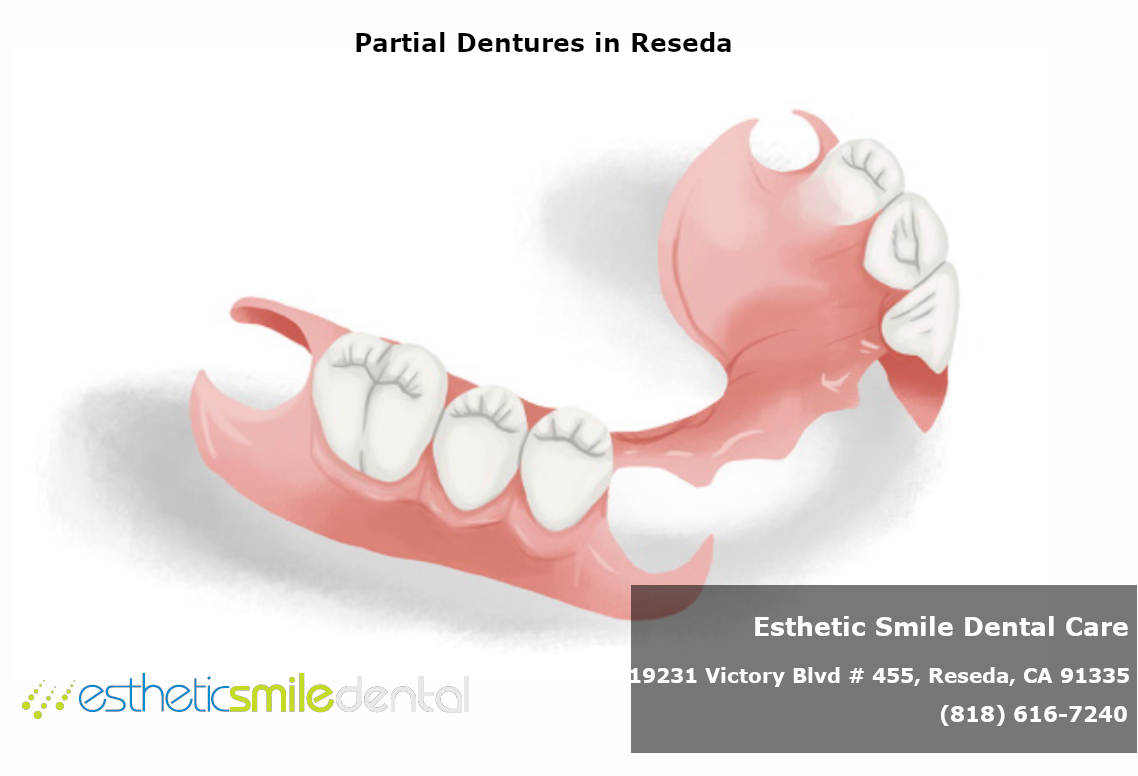
Restorative dentistry offers solutions for tooth loss, including bridges and dentures. These prosthetics can be partial or complete sets, depending on the extent of tooth loss. Removable partials restore the ability to smile and chew, maintain natural contours, and reduce gum problems. They also prevent neighboring teeth from shifting and alleviate jaw stress.
Partial dentures are employed when a patient has lost one, two, or several teeth in a row. These dentures can be attached to a metallic frame, filling in the gaps left by missing teeth.
PARTIALS VS. TRADITIONAL FULL SETS
Both treatments, partials and full dentures, cater to different needs, each with its own advantages and drawbacks. Here are the key differences:
Function
- Full sets are necessary when most teeth in the jaw are lost.
- Partials replace one or more missing teeth in a jaw.
Extraction
- Partial dentures prevent extraction of other teeth, replacing only the missing ones.
- Full sets require removal of all remaining teeth.
Permanent or Removable
- Partials can be fixed (dental bridges) or removable, with implant-supported bridges being a type of fixed partial denture.
- Full sets are generally removable, with traditional dentures relying solely on soft tissues and jawbone for retention.
Price
- Partials are more cost-effective than complete sets.
- The cost of extraction is included in the total cost of full dentures, whereas partials often don’t necessitate tooth extraction.
PARTIAL DENTURES TYPES AND MATERIAL
There are various types of partial dentures, each utilizing different materials. The choice of partial dentures is typically based on the patient’s comfort, aesthetics, and affordability. Here are some options:
Cast Metal Removable
- Common and durable, attached using metallic wire clasps.
- Aesthetic attachments available but are often more expensive.
- Lasts for many years with proper care.
Acrylic Removable (Flipper)
- The cheapest option, with a thick acrylic base to minimize breakage.
- Attached with visible metal clasps.
- Often a temporary solution, but can last for years before replacement.
Flexible
- Ideal for those uncomfortable with rigid bases.
- Thin, heat-sensitive, flexible nylon base with gum-colored wires.
- Comfortable and natural-looking.
Fixed Bridge
- Excellent for replacing one or two teeth.
- Artificial teeth with crowns on either side fit into healthy surrounding teeth for support.
- Permanent fixture with strength and durability.
Implant-Supported Fixed Bridge
- Does not damage existing teeth for attachment.
- Implants secure to the jawbone, acting like natural roots.
- Allows for full arch or full mouth restorations with a sufficient number of implants.
- Permanent and free of diet limitations, gaining popularity despite additional cost.
Esthetic Smile Dental Care recommends implant-supported removable or fixed dentures for durability, comfort, and natural appearance. If unsure, feel free to ask us for guidance in choosing the best option for you.
HOW MUCH DOES PARTIAL DENTURES COST?
Partial denture costs vary, ranging from $400 to $1,800 per arch. Factors influencing the cost include the number of teeth, materials used, and the location of the teeth (top/upper or bottom/lower). Dental insurance may contribute to making partial dentures affordable. Schedule an appointment for further information.
Reseda, PARTIAL DENTURES
For a more comfortable partial denture experience and a confidence-boosting smile, consider our Complete Dentures procedure. We proudly offer California Dentures to our community members.
Learn more About Us
PARTIAL DENTURES FAQ
Esthetic Smile Dental Care offers various partial dentures, with flexible ones being favored by many patients due to their lightweight, thin, and flexible nature compared to acrylic dentures. Removable partials closely match the gum color and can be attached with a metal framework or a more natural-looking connector. Using high-quality materials enhances the natural appearance. Both bridge and partial dentures are effective tooth replacement solutions. Bridges are permanently attached to surrounding teeth, while partials are removable and suitable when surrounding teeth can't support a bridge. Removable partial dentures may increase plaque buildup, leading to cavities and gum disease. Proper oral hygiene and denture care can prevent these issues. Yes, eating with partial dentures is possible, but it takes time to get used to. Avoid hard foods and cut small bites, especially with partial front teeth, to prevent damage. Any tooth replacement is worthwhile as it prevents bone resorption around the empty socket, avoiding oral health problems and maintaining natural eating and speaking abilities. Typically, a partial denture for two teeth costs between $400 to $1,800, varying based on materials and location. A partial for three to four teeth can cost about $700 to $900, depending on materials and location. Flexible partials, lighter than acrylic dentures, cost between $400 to $1,800, depending on materials and location of missing teeth.What are the best partial dentures to get?
Do partial dentures look natural?
What is better, a bridge or a partial?
Do partials damage teeth?
Can you eat with partials?
Are partial dentures worth it?
How much does a partial denture cost for 2 teeth?
How much does a 3-tooth partial cost?
How much is a flexible partial denture?
PARTIAL DENTURES NEAR ME
When selecting a dentist, prioritize proximity to your residence, workplace, or school to save time and money. Anticipate multiple treatment or follow-up appointments, along with routine visits. Opting for a nearby dentist ensures quicker and more cost-effective appointments, eliminating the need for extensive travel. Seek a dentist with favorable reviews in partial dentures and one with whom you’ll be content working.
